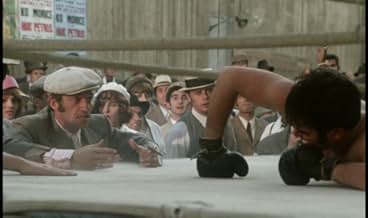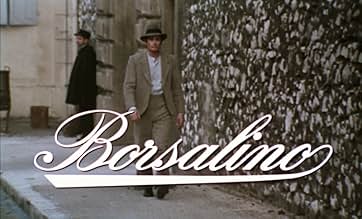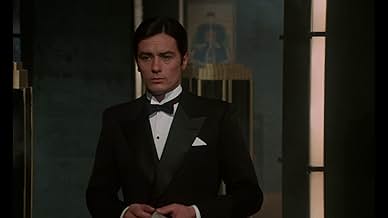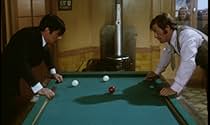Borsalino
- 1970
- Tous publics
- 2h 6m
IMDb RATING
6.8/10
5.4K
YOUR RATING
During the 1930s, in Marseilles, France, two small time crooks work for local crime bosses until they decide to go into business for themselves.During the 1930s, in Marseilles, France, two small time crooks work for local crime bosses until they decide to go into business for themselves.During the 1930s, in Marseilles, France, two small time crooks work for local crime bosses until they decide to go into business for themselves.
- Awards
- 3 nominations total
Featured reviews
For some reason my little local library in Minnesota has this movie. Its about a pair of small-time criminals in 1930s Marsielles, France who rise to be gangster bosses. The movie looks pretty good, with nice period clothes, cars and decor, and the guys look the part in their 30's gangster suits (especially the dark-haired guy). And Lola the girlfriend is pretty hot. And there's some decent tommy-gun violence. But the characters seem cardboard and undeveloped, and the dialog is not very interesting (maybe something was lost in the dubbing). I sensed they were trying to imitate an old-style Hollywood gangster movie a la Cagney; was 30's France really this much like Capone's Chicago? So, although I am a big fan of old gangster movies, I wouldn't rate this one too highly.
"Borsalino" is one of the all-time fun French gangster films. I saw it in a cinema in Paris when I studied there eons ago, but just try to find the DVD or videotape! I guess they're trying to increase its rarity value by foisting a much inferior film, Borsalino & Company, on Delon and Belmondo fans. Well, this is the genuine article, more Marseille than the real city, perhaps 70 years or so ago, so just enjoy the great dialogue and scenarios IF YOU EVER MANAGE TO GET YOUR HANDS ON THIS TAPE OR (BETTER) DVD, NOT DUBBED but with subtitles s'il vous plaît. The soundtrack by Claude Bolling (sporadically available on CD) is the perfect accompaniment, and the combination of the French cinema's two most popular young actors made this an all time favorite in France. In the final analysis, style certainly triumphs over substance, and you'll never forget you are seeing Delon and Belmondo. This film has stuck in my mind all these years, and I think you'll be just as impressed as I was... bonne chance!
I liked this film and became a Belmondo and Delon fan because of it. The story fosters traditional friendship values : Loyalty , affection , and it underwrites pursuit of dreams.
All production values are a little over dramatic , which worked for me given the slightly hammy machismo of the stars. These guys looked like they really are friends off-screen and maybe had a lot of fun making the film. They are a couple of real characters and it shows through. They're better at playing themselves than at acting
Interesting sepia stills for credit backgrounds which predate Butch Cassidy's use of them as nostalgia evocation.
Somewhat typical of foreign films of the period , the continuity was sometimes uneven . But that wasn't particularly disruptive because of the un-complex story line.
All production values are a little over dramatic , which worked for me given the slightly hammy machismo of the stars. These guys looked like they really are friends off-screen and maybe had a lot of fun making the film. They are a couple of real characters and it shows through. They're better at playing themselves than at acting
Interesting sepia stills for credit backgrounds which predate Butch Cassidy's use of them as nostalgia evocation.
Somewhat typical of foreign films of the period , the continuity was sometimes uneven . But that wasn't particularly disruptive because of the un-complex story line.
Borsalino tells the rise and fall of two small-time crooks in 1930 Marseille. Their rivalry soon becomes a strong friendship, allowing them to reach a place in the sun among other gangsters, even threatening the truce between the two ruthless families that control the city.
Jean-Paul Belmondo and Alain Delon shine in this enjoyable recreation of the ever-corrupted French city. The sets and costumes are terrific, and the music by Claude Bolling became an instant classic. So classic in fact that the director Jacques Deray over-uses it in some parts. The secondary characters are interesting somewhat but clearly overshadowed by the two leads. As for the script, it manages many enjoyable moments wandering between funny and tragic bits, however it is too hammy to totally convince and is not helped by a very dated type of editing. I don't know if it was to mimic the style of older gangster movies, but the movie should've been tighter on that point.
All in all, a very decent French movie. Far from flawless, but recommended.
Jean-Paul Belmondo and Alain Delon shine in this enjoyable recreation of the ever-corrupted French city. The sets and costumes are terrific, and the music by Claude Bolling became an instant classic. So classic in fact that the director Jacques Deray over-uses it in some parts. The secondary characters are interesting somewhat but clearly overshadowed by the two leads. As for the script, it manages many enjoyable moments wandering between funny and tragic bits, however it is too hammy to totally convince and is not helped by a very dated type of editing. I don't know if it was to mimic the style of older gangster movies, but the movie should've been tighter on that point.
All in all, a very decent French movie. Far from flawless, but recommended.
Director Jean-Pierre Melville told his biographer that his plan was to reunite France's two greatest stars of the 1960-70s, Delon and Belmondo, in LE CERCLE ROUGE, but Belmondo thought his part meager by comparison with Delon's, rejected it, Gian Maria Volonté replaced him, and so BORSALINO, directed by Jacques Deray, remains the only film in which Delon and Belmodo appeared together.
Melville was an infinitely better director than the mediocre Deray. I doubt that a period film (1930s) like BORSALINO would interest Melville, but in the hands of the latter I am certain that BORSALINO would be far grittier, realistic, and less tailored for Delon.
Make no mistake, I rate Delon a better actor than Belmondo but, as the film's producer, it is obvious that he had decisionmaking powers that Belmondo did not, and you sense how strenuous the rapport must have been between the two men, with Belmondo feeling belittled and duped, and with Delon getting extensive "look good" shots throughout.
Despite being the better actor, Delon is too wooden in this film. He always looks stiff as he tries to display his famous physical attributes. In turn, Belmondo just looks like he is honoring the contract and can't wait for the shooting to be over. According to reports, Delon and Belmondo hardly talked to each other during production, and never again after shooting was over.
Even the usually reliable Bouquet looks pedestrian in this production, and the female lead, Rouvel, is a near non-entity. She starts as the love object both men want, then seems to go with Delon, but finally stays with Belmondo, and one can see that she looks lost. Her part is small and adds zero to the film.
Cinematography is careless. Stunts are poor. The fight between the two men at their first encounter would have suited a Bud Spencer-Terence Hill vehicle, but actors like D&B are wasted here.
The meandering script is very glib, keep skipping over details, and there's far too much padding. 30 minutes could have been removed and the film might even be better for it.
Melville was an infinitely better director than the mediocre Deray. I doubt that a period film (1930s) like BORSALINO would interest Melville, but in the hands of the latter I am certain that BORSALINO would be far grittier, realistic, and less tailored for Delon.
Make no mistake, I rate Delon a better actor than Belmondo but, as the film's producer, it is obvious that he had decisionmaking powers that Belmondo did not, and you sense how strenuous the rapport must have been between the two men, with Belmondo feeling belittled and duped, and with Delon getting extensive "look good" shots throughout.
Despite being the better actor, Delon is too wooden in this film. He always looks stiff as he tries to display his famous physical attributes. In turn, Belmondo just looks like he is honoring the contract and can't wait for the shooting to be over. According to reports, Delon and Belmondo hardly talked to each other during production, and never again after shooting was over.
Even the usually reliable Bouquet looks pedestrian in this production, and the female lead, Rouvel, is a near non-entity. She starts as the love object both men want, then seems to go with Delon, but finally stays with Belmondo, and one can see that she looks lost. Her part is small and adds zero to the film.
Cinematography is careless. Stunts are poor. The fight between the two men at their first encounter would have suited a Bud Spencer-Terence Hill vehicle, but actors like D&B are wasted here.
The meandering script is very glib, keep skipping over details, and there's far too much padding. 30 minutes could have been removed and the film might even be better for it.
Did you know
- TriviaThe film was based on real life gangsters Paul Carbone and François Spirito. Alain Delon found the story in a book he was reading about French gangsters from 1900 to 1970. He produced the film looking for a vehicle for him to co-star with Jean-Paul Belmondo.
- GoofsWhen François Capella (Belmondo) goes to the beach with Roch Siffredi (Delon), François wears his black swimsuit the wrong way around. His nipples are visible. The back is his front, and in some shots where he comes back with Ginette he has the swimsuit on the right side. In some shots he has the swimsuit on the wrong way again, which repeats.
- Quotes
Martial Roger, le comptable: In love as in business, some things remain unwritten.
- ConnectionsFeatured in Tango Bar (1987)
- SoundtracksPrends-Moi Matelot
Music by Claude Bolling
Lyrics by Jacques Deray and Jean-Claude Carrière
Performed by Odette Piquet
- How long is Borsalino?Powered by Alexa
Details
Box office
- Gross US & Canada
- $1,090,000
Contribute to this page
Suggest an edit or add missing content
































